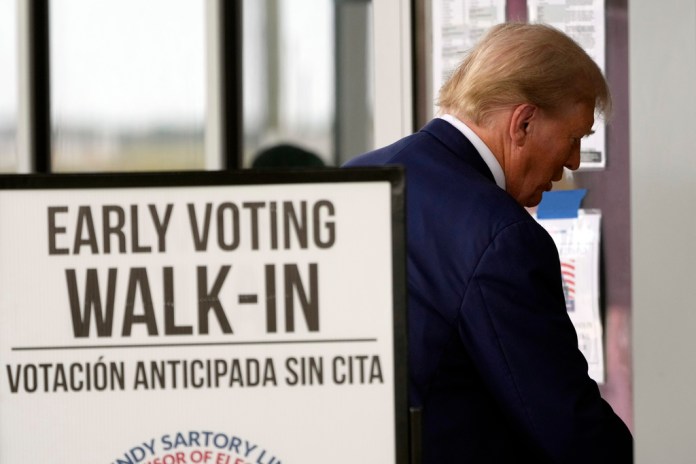Suits: Never Resided Voting In NC, MI Violates State Constitutions
The Republican National Committee (RNC) has filed two lawsuits against North Carolina and Michigan, challenging how both states allow overseas citizens to vote in U.S. elections. This marks the RNC’s fifth lawsuit against the North Carolina State Board of Elections and sixth against Michigan’s Secretary of State, Jocelyn Benson, as both states are considered important battlegrounds for the upcoming presidential election. The RNC asserts that allowing individuals who have never lived in these states to vote undermines election integrity, with RNC Chairman Michael Whatley stating that this practice is illegal.
The lawsuits focus on the application of the Uniformed and Overseas Citizens Absentee Voting Act (UOCAVA) by both states, which permits certain overseas citizens, including military personnel and diplomats, to register and vote absentee. In North Carolina, the RNC claims the state is misapplying its laws, allowing people without state residency to register, thereby diluting the votes of actual residents. They argue this practice violates North Carolina’s constitutional definition of eligible voters.
The situation is similar in Michigan, where the guidance from Secretary Benson allows U.S. citizens who have never resided in the country to vote, contradicting the state’s constitutional requirements for residency. Local election officials feel pressured to comply with this guidance despite the constitutional conflict.
Both lawsuits aim to uphold state laws that require residency for voting, claiming that current procedures expose elections to fraud and mischief, thus threatening the integrity of the electoral process.
The Republican National Committee (RNC) filed more lawsuits against North Carolina and Michigan, this time challenging how the states allow persons in other countries to vote in U.S. elections.
The tandem lawsuits represent the RNC’s fifth against the Democrat-run North Carolina State Board of Elections (NCSBE) and sixth against Democrat Secretary of State Jocelyn Benson of Michigan. Both states are expected to be tight battlegrounds in this year’s presidential election.
“North Carolinians and Michiganders should not have their votes canceled by those who’ve never lived in the state in the first place — plain and simple,” RNC Chairman Michael Whatley said in a press release. “This is illegal and we will stop it. While Democrats want an election system that disregards the law, we are committed to election integrity across the country.”
Both lawsuits take issue with how the states apply the Uniformed and Overseas Citizens Absentee Voting Act (UOCAVA), which requires states to allow certain overseas citizens — for example, those who are in the military or are otherwise stationed in other countries (such as a diplomat) — to register and vote absentee.
North Carolina
The RNC, the North Carolina Republican Party, and voters in the state filed the North Carolina complaint, alleging that North Carolina is recklessly applying the Uniform Military and Overseas Voters Act (UMOVA) to allow those who have never resided in the state to participate in its elections.
Two North Carolina voters in the suit say allowing overseas nonresidents to vote dilutes their own votes and argue that the state unlawfully registered voters who effectively cancel their own ballots.
The Republican plaintiffs are seeking a judgment stating that NCSBE’s application of the law is unconstitutional, as the North Carolina Constitution defines eligible voters as those who have “resided” in the state.
In North Carolina, a voter is counted as “any person who has resided in the State of North Carolina for one year and in the precinct, ward, or other election district for 30 days next preceding an election, and possesses the other qualifications set out in this Article.” Such a person “shall be entitled to vote at any election held in this State,” according to Article VI of the state constitution.
North Carolina’s UMOVA goes well beyond the mandate of UOCAVA by allowing those who have never lived in the state (or even the United States) to vote there, the lawsuit states.
“Under UMOVA, certain people not covered by UOCAVA who have never resided in North Carolina (or perhaps anywhere else in this country) are registering to vote and voting in all its elections, including local, state, and federal contests, statewide ballot measures, and any other election where absentee ballots are employed,” the filing reads. “This is not only a violation of the North Carolina Constitution, but, as applied to Plaintiffs, it dilutes their votes and harms their organizational missions.”
While North Carolina voters under the purview of UOCAVA are not required to abide by the state’s voter identification requirement law, the lawsuit alleges that North Carolina election officials are treating UMOVA voters as though they were UOCAVA voters, and allowing them to vote without showing ID as well.
“This not only exposes our elections to substantial risk of fraud and other misconduct, but it is contrary to state law,” the lawsuit states. North Carolina also has a law compliant with the federal Help America Vote Act (HAVA), which requires those registering to vote to present identifying documents, like a driver’s license or the last four digits of a Social Security number, in order to register.
Evidence used in the lawsuit purportedly shows September guidance from the NCSBE telling county election officials that state law exempts overseas voters from the HAVA identification requirements if their identification does not match the records in government databases.
In addition, the suit references an August email from NCSBE Executive Director Karen Brinson Bell to Henderson County Election Board member Linda Rebuck. “When a military or overseas citizen voter submits their ballot, neither federal nor state law requires them to provide ID when returning their ballot,” Brinson Bell stated. She explained that UOCAVA voters are “expressly exempt” from HAVA requirements.
Republicans are also seeking to void the September guidance and block election officials from accepting voter registrations from those who do not meet HAVA requirements and do not qualify for the UOCAVA exemption. They also want county clerks not to process ballots of individuals who have never lived in North Carolina.
The NCSBE did not respond to a request for comment from The Federalist.
Michigan
In Michigan, the Michigan Republican Party and Chesterfield Township Clerk Cindy Berry joined the RNC in its challenge against “unlawful guidance” from Benson that allows “a United States citizen who has never resided in the United States but who has a parent, legal guardian, or spouse who was last domiciled in Michigan” to vote.
Like North Carolina, Michigan’s constitution also requires that only Michigan residents can vote, and the lawsuit argues that the guidance from Benson is at direct odds with the constitutional requirement.
“The dissonance between the secretary’s guidance and the Constitution has created confusion, disorder, and strife because city and township clerks are subjected to two incompatible duties,” the Republican attorneys wrote in the filing.
In an affidavit, Berry contended that she is concerned she could “face penalty or even removal” if she followed Benson’s guidance.
Benson brushed off the concerns about those who have never resided in Michigan or the country being allowed to vote as a “campaign to spread unfounded distrust” in the election.
According to Bridge Michigan, fewer than 16,000 voters are registered as overseas voters, but in close states, that number could affect the margin on election night. Benson spokeswoman Angela Benander told the outlet that the state does not even “track the number” of never resided voters.
The lawsuit is asking that all never resided ballots be rejected, or that they at least be segregated in order to “ascertain the scope of the constitutional violation and whether it effects [sic] the election’s outcome.”
As The Federalist reported, most (38) U.S. states allow citizens who have never resided in the country to vote, and they can do it using virtually any address. My colleague Beth Brelje wrote, “It is hypothetically possible to sit in Anytown, U.S.A., and request that a UOCAVA ballot be emailed to you, while claiming you are abroad.”
It is also certainly possible to have never stepped foot in the United States, never intend to, and vote in elections, so long as your parents resided in the country at one point.
For more election news and updates, visit electionbriefing.com.
Breccan F. Thies is an elections correspondent for The Federalist. He previously covered education and culture issues for the Washington Examiner and Breitbart News. He holds a degree from the University of Virginia and is a 2022 Claremont Institute Publius Fellow. You can follow him on X: @BreccanFThies.
" Conservative News Daily does not always share or support the views and opinions expressed here; they are just those of the writer."




